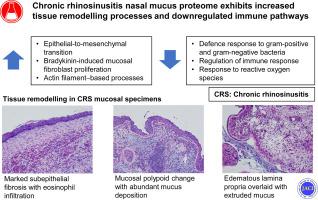Journal of Allergy and Clinical Immunology ( IF 11.4 ) Pub Date : 2020-08-01 , DOI: 10.1016/j.jaci.2020.06.037 Stephen Shih-Teng Kao 1 , Ahmed Bassiouni 1 , Mahnaz Ramezanpour 1 , John Finnie 2 , Nusha Chegeni 3 , Alex D Colella 3 , Timothy K Chataway 3 , Peter-John Wormald 1 , Sarah Vreugde 1 , Alkis James Psaltis 1

|
Background
Chronic rhinosinusitis (CRS) has a complex and multifactorial pathogenesis with a heterogeneous inflammatory profile. Proteomic analysis of nasal mucus may enable further understanding of protein abundances and biologic processes present in CRS and its endotypes compared with in healthy patients.
Objective
Our aim was to determine differences in the nasal mucus proteome of healthy patients and patients with CRS.
Methods
Nasal mucus was obtained from healthy patients, patients with CRS without nasal polyps (CRSsNP), and patients with CRS with nasal polyps (CRSwNP) before surgery. Gel electrophoresis was performed to fractionate the complex protein extracts before mass spectrometry analysis. Gene set enrichment analysis was performed on differentially expressed proteins.
Results
A total of 33 patients were included in this study (12 healthy, 10 with CRSsNP, and 11 with CRSwNP). In all, 1142 proteins were identified in mucus samples from healthy patients, 761 in mucus samples from patients with CRSsNP, and 998 in mucus samples from patients with CRSwNP. Dysfunction in immunologic pathways, reduced cellular signaling, and increased cellular metabolism with associated tissue remodeling pathways were present in patients with CRS compared with in healthy patients.
Conclusion
Significant downregulation of mucosal immunity and antioxidant pathways with increased tissue modeling processes may account for the clinical manifestations of CRS. Ultimately, the differing proteome and biologic processes provide further insight into CRS pathogenesis and its endotypes.
中文翻译:

健康患者和慢性鼻鼻窦炎患者鼻粘液样本的蛋白质组学分析。
背景
慢性鼻-鼻窦炎(CRS)具有复杂的多因素发病机制,具有异质性炎症。与健康患者相比,对鼻粘液进行蛋白质组学分析可以进一步了解CRS及其内型中存在的蛋白质丰度和生物学过程。
目的
我们的目的是确定健康患者和CRS患者鼻黏膜蛋白质组的差异。
方法
术前从健康患者,无鼻息肉的CRS患者(CRSsNP)和有鼻息肉的CRS患者(CRSwNP)获得鼻粘液。在质谱分析之前,进行凝胶电泳以分离复杂的蛋白质提取物。对差异表达的蛋白质进行基因集富集分析。
结果
本研究共纳入33位患者(12位健康患者,10位CRSsNP患者和11位CRSwNP患者)。在健康患者的粘液样本中共鉴定出1142种蛋白质,CRSsNP患者的粘液样本中鉴定出761种蛋白质,CRSwNP患者的粘液样本中鉴定出998种蛋白质。与健康患者相比,CRS患者存在免疫途径功能障碍,细胞信号传导减少以及具有相关组织重塑途径的细胞代谢增加。
结论
随着组织建模过程的增加,粘膜免疫力和抗氧化剂途径的显着下调可能解释了CRS的临床表现。最终,不同的蛋白质组和生物学过程为CRS发病机理及其内型提供了进一步的认识。











































 京公网安备 11010802027423号
京公网安备 11010802027423号